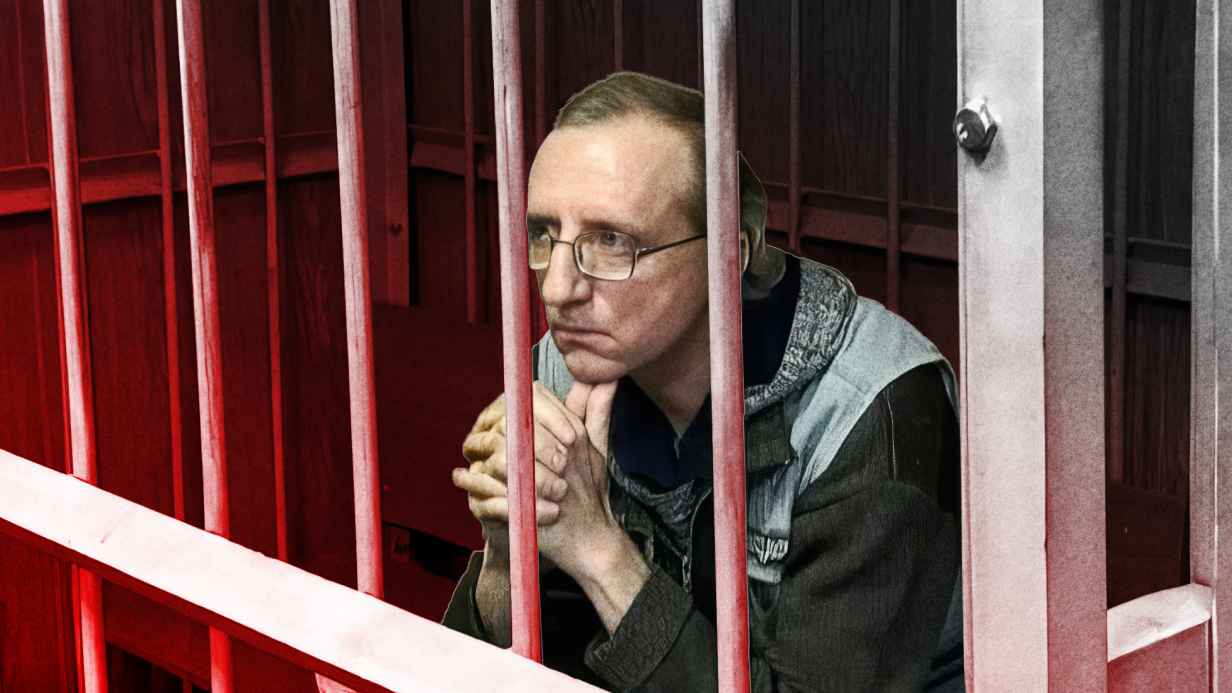
The Gatchina District Court has resumed hearings in the case of Dmitry Bogmut, a technician at the Petersburg Nuclear Physics Institute named after B.P. Konstantinov (part of the Kurchatov Institute). After the onset of the war in Ukraine, Bogmut posted anti-war videos in a private thread on a forum with only a dozen users. He has been held in a pre-trial detention center for a year and a half and faces up to ten years in prison. Court hearings are regularly attended by a crowd of men in camouflage, seemingly organized as “extras”, identified as “Donbas volunteers.” Meanwhile, the names of activists supporting Bogmut have been publicly disclosed by state news agencies, leading to threats against them.
“They’ll let you rot in prison”
50-year-old Dmitry Bogmut was the first resident of Leningrad Oblast to be charged with “spreading false information about the Russian army”. The reason for his arrest was “text, videos, and images” he shared online. One specific piece of content is known: a video by Deutsche Welle titled “Attack on Pavlohrad, how Putin is preparing for a defensive war and undermining the combat capability of the Russian army.” The video was released in May 2023, and Dmitry shared it in a private thread on the well-known Russian tech forum iXBT.com. “The forum had, or still has, a section called ‘Modern Politics and Macroeconomics,’ which included a private thread for 10-12 long-time users titled ‘What has Putin done for the people in 24 years.’ There, Dmitry quoted Nevzorov, Michael Naki, and other sharp critics of Putin and his aggression. He suspects that he was reported either by one of the users in that private thread or by the forum administration,” according to Bogmut’s support group.
Top news on scientists’ work and experiences during the war, along with videos and infographics — subscribe to the T-invariant Telegram channel.
On April 4, 2024, six law enforcement officers, including those from the Investigative Committee of Leningrad Oblast, arrived at the institute’s laboratory. They searched his workplace, seized equipment, and detained Dmitry. On April 5, the Oktyabrsky District Court in St. Petersburg ordered his arrest. During the preliminary investigation, Bogmut stated that he was “critical of the special military operation” (the euphemism the Russian government uses for the war in Ukraine) and expressed remorse for posting information online. At a recent court hearing on Wednesday, the prosecutor read out these statements. Bogmut declined to provide new testimony, noting that he had previously incriminated himself “under the influence of a cellmate in the detention center,” who was placed with him in his second week there.
“Regarding my confession — it was kindly (air quotes) suggested by this individual. He intimidated me, saying they’d let me rot in prison and throw the book at me. There was psychological pressure. I didn’t report it because I feared retaliation from this person, who claimed to know high-ranking FSB officials. Please note in the record that I’ve forgotten his name and surname,” Bogmut said at the court hearing (audio available to the T-invariant editorial team).
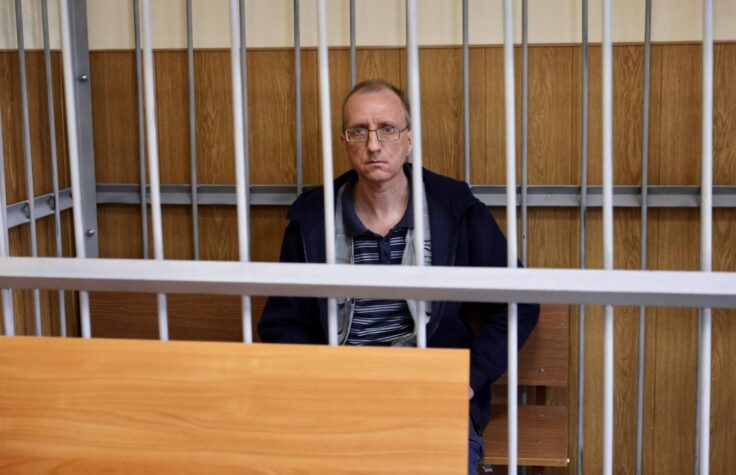
Bogmut also stated that the actions he is accused of — posting comments online criticizing the war in Ukraine — were not public in nature: “The group in that tiny thread consisted of 10–12 users. I don’t know who was behind them; they could’ve been bots. I had no intent to spread knowingly false information, as I trusted the sources I got it from. If anything, my intention was to share truthful information. The very phrase ‘spreading knowingly false information’ infuriates and frustrates me — it’s an outright lie.”
Bogmut has been in pre-trial detention for a year and a half. During this time, he has been moved between five cells, lost 10 kilograms, suffered various illnesses, lost two teeth (they crumbled, as proper dental treatment was unavailable in the detention center), written a scientific article, and met dozens of fellow inmates.
“I’ve seen all sorts here, from petty thieves to big shots who once held high offices. Right now, I’m sharing a cell with a Dagestani, a Tajik, and a Russian. We get along fine. You know, I’m growing tired of other inmates telling me how smart and educated I am. They don’t understand why I’m here or who thought it was a good idea to lock me up — they’re genuinely baffled. I told the Tajik, ‘They think I’m an enemy of the people.’ He replied sternly, ‘Never say that, Dima. You’re a friend of the people,’” Dmitry wrote from the detention center.
In his letters, he admits that he dreams of his former job at the nuclear physics institute: “I had a dream that I was decontaminating a radiation-affected room at my institute. I woke up thinking I needed to submit a report to the head of the radiation safety department, only to realize, when I rubbed my eyes, that I’m in a detention center. Yesterday, while showering, I suddenly wondered if the water was radioactive… Just kidding, of course. Long story short, I need to get out of this so-called ‘resort’ and back to the institute!”
For ten years, Bogmut worked as a technician in the Laboratory of Neutron Physical-Chemical Research at the institute, contributing to scientific projects. He lacks a higher education degree, which prevented him from becoming a research scientist, says his acquaintance Andrey (last name withheld for safety reasons).
“As a child, he lived with his grandmother,” Andrey recounts. “He was an outstanding student in high school but did not graduate from university. After his grandmother passed away, Dmitry had to work at the Gatchina Powder Coatings Plant. He worked there for many years, invented things, and even received an award from the director for his significant contributions to the plant’s development.”
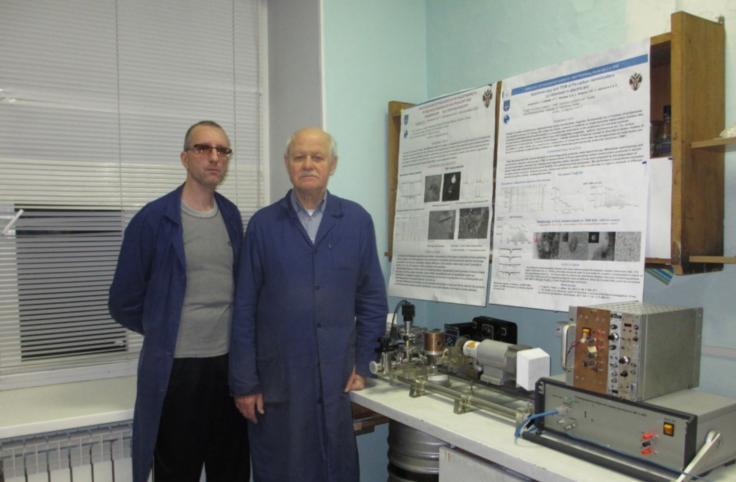
“It was clear that sooner or later, his online statements would lead to his arrest,” says another acquaintance, Alexander. “His grandfather died liberating Ukraine, and Dmitry considered himself Ukrainian. His posts have been deleted, but nothing can be completely erased.”
Camouflaged “beneficiaries”
The Gatchina City Court began hearing Bogmut’s case in January 2025. Almost immediately, individuals in camouflage started attending the hearings, taking up most of the seats, leaving little room for journalists or Bogmut’s supporters, according to reports. When asked who they were, these individuals called themselves “beneficiaries” (veterans with social benefits) and threatened to confiscate phones from attendees who tried to film them. They also flashed veteran IDs and claimed their “association” was authorized to confiscate phones. According to SOTAvision, these individuals are members of the “Union of Donbas Volunteers,” established in 2015 to, as stated on their VKontakte page, “represent and protect the interests of Donbas volunteers.” SOTAvision noted that these “volunteers” often arrived at hearings smelling of alcohol, using profane language, and threatening other attendees.
“Sometimes there are many of them, sometimes none at all. It’s clear someone is coordinating their presence at the hearings,” says Andrey. “We tried asking what they’re doing there, but we didn’t get clear answers. They weren’t at the September 17 hearing.”
“As far as I understand, they enter through the court’s service corridors. At one hearing, one of these guys attacked one of our female supporters,” recalls Natalia from Bogmut’s support group. “She later said she tried to pass by, but he put her in a headlock. She looked at the bailiff, who clearly saw everything but turned away. Later, he said he saw nothing. We called the police, but those camouflage guys vanished from the courthouse. Someone must have let them out.”
According to Natalia, the court bailiffs also cause problems for Bogmut’s support group. “There’s one bailiff, our ‘favorite,’ who pays us a lot of attention. He’ll pick a fight, try to ban recording in the hallway, or say something odd. On September 17, he tried to stop us from making audio recordings, but we quickly explained that it’s illegal. Once, they kept us out of the courtroom so long that the hearing ended. Meanwhile, those camouflage guys made it inside.”
On June 15, the state news agency TASS published the names of activists attending the hearings to support Bogmut, labeling them “pro-Ukrainian activists.” The article claimed, citing a law enforcement source, that “a group of pro-Ukrainian activists regularly shows up at the court, trying to disrupt hearings, provoke the police, and call Bogmut a political prisoner.” Later, a list of the attendees’ names appeared in anonymous Telegram channels, along with their contact details, photos, and calls to “send them their regards.” After this, the activists began receiving threats from unknown individuals.
Up-to-date videos on science during wartime, interviews, podcasts, and streams with prominent scientists — subscribe to the T-invariant YouTube channel!
“The first message came on VKontakte at night. It contained threats, and I didn’t initially understand why,” says Anna, a St. Petersburg resident, referring to VK.com, a popular Russian social network similar to Facebook. “It wasn’t frightening, just unpleasant. Then I got a couple of threats on Telegram. Later, we discovered the TASS publication exposing the names of those attending the hearings. I don’t come often — I’ve been there maybe three times before. Given that the anonymous Telegram channels publishing our details have about 30,000 subscribers, and I received six or seven threats, their impact seems pretty limited.”
“I wake up after another hearing for Dmitry Bogmut, and, like in that old Soviet movie “TASS is authorized to declare” that I’m a traitor and extremist, an enemy of the people, in other words. But I consider myself a patriot and a law-abiding citizen — awkward, to say the least,” recounts St. Petersburg human rights activist Dinar Idrisov. “I got all sorts of messages, from insults and mockery to threats. I was surprised — I don’t recall anything like this from monitoring repressive cases. Yes, there have been threats and attacks, but not after court hearings. I see this as a test by local law enforcement, likely with federal approval, to suppress solidarity with political prisoners and hinder the spread of accurate information about their court proceedings.”
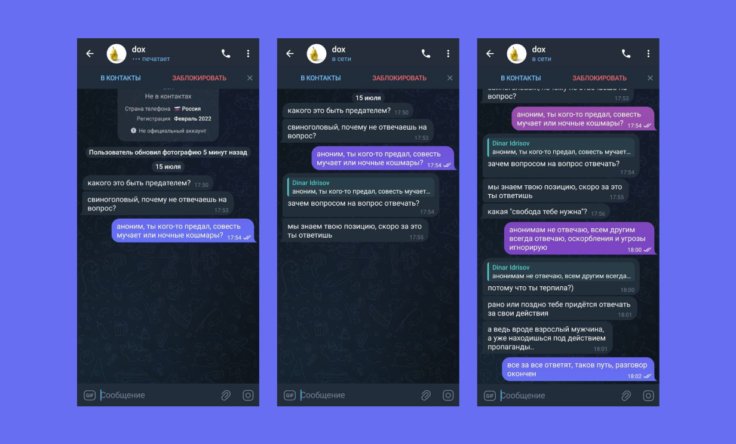
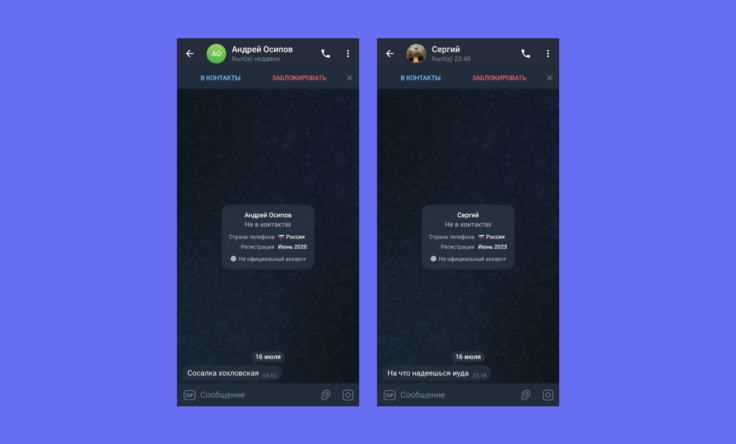
According to Citizen Watch, a public organization monitoring court hearings since 2016, St. Petersburg courts meticulously record the personal details of attendees at “political cases.” Previously, these details were not published in the media. “The details of attendees at the cases of Vsevolod Korolev and Olga Smirnova (also charged with spreading ‘fakes’ about the Russian armed forces) were recorded not only in the standard visitor logbook at the court entrance, which includes passport information, but also on a separate list. From a bailiff’s phone conversation, our observer inferred that these lists were passed to the Center for Countering Extremism. But this is the first time we’ve seen not veiled threats from a prosecutor or bailiff but a public threat in a state media outlet, naming people’s surnames and initials. TASS accuses attendees of disrupting court order, though such conclusions are for the judge, not the media. The court can remove a disruptive attendee, but the article doesn’t mention this happening,” Citizen Watch notes.
A nightmare
The court continues to refuse Bogmut’s request for house arrest, despite the prosecution’s failing to provide specific reasons for keeping him in pre-trial detention, his lawyer says. His detention has been extended multiple times. During hearings, Bogmut stated that he could not possibly flee house arrest, as he lacks a foreign passport needed for international travel. He also reported that his health was declining and his chronic conditions were worsening in pre-trial detention. Due to nervous exhaustion, he has lost significant weight, weighing just over 60 kilograms at a height of 182 cm.
“Here is a list of my health complaints: exhaustion (muscle atrophy in the limbs), heart arrhythmia, intestinal pain from prison food, and discomfort and pain in the liver area. In 2022, I underwent a comprehensive medical examination, which revealed hypertension, incomplete right bundle branch block, arrhythmia, chronic pancreatitis, hepatomegaly, liver cysts, widened subarachnoid space from a 2020 traumatic brain injury, and severe myopia (minus 9 in both eyes),” Bogmut shared with journalists.
Yet the court sides with the prosecutor, who argued that Bogmut’s alleged crime “targets public safety and order, posing a heightened public danger.”
Meanwhile, Bogmut’s colleagues and superiors speak highly of him in court. His direct supervisor stated at one hearing that Bogmut is a highly valuable employee who has surpassed his educational level and is indispensable for many of the institute’s projects.
From his cell, Bogmut continues his scientific work. In June, a scientific article was published in the journal Atomnaya Energiya (Atomic Energy), to which Dmitry contributed. He was not listed as a co-author because the article was submitted in July 2024, after he had been arrested. Despite his significant contribution, Dmitry is only mentioned in the acknowledgments.
“The article describes a physical model of a Mössbauer spectrometer for a nuclear reactor’s neutron beam, developed with Dmitry’s active participation in the laboratory of the Petersburg Nuclear Physics Institute,” writes his support group. “Developing such a spectrometer for a neutron beam enables research on new fundamental and applied scientific questions.”
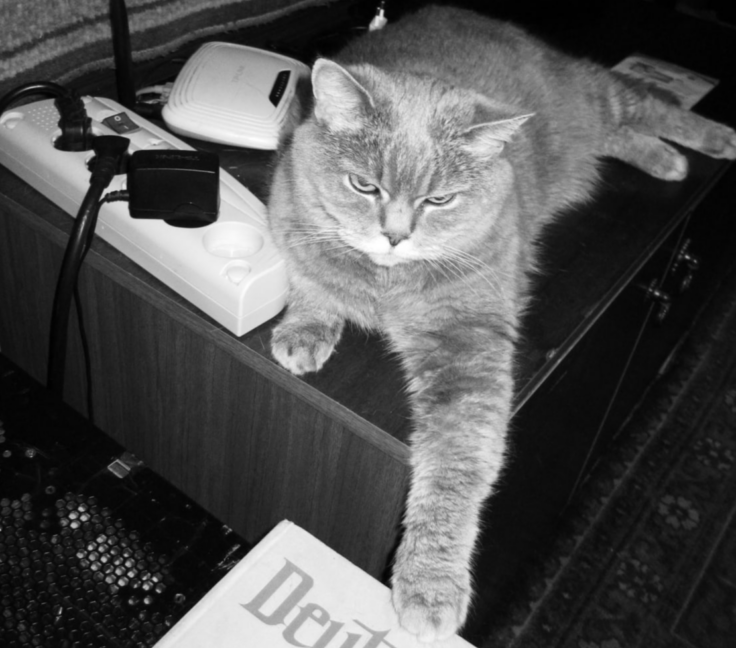
Dmitry has no family. At home in Gatchina, only his beloved cat, Nicolette, who lived with him for twelve years, was waiting for him. After his arrest, distant relatives took her in. She passed away last winter.
“You ask what I was prepared or unprepared for when I ended up in prison? The answer is simple: I was completely unprepared for everything, as my arrest hit me like a punch in the gut, sudden and unexpected,” Bogmut wrote in one of his letters. “For a while, I had a persistent feeling that this was a nightmare I’d wake up from, and it would disappear… If I could go back to the day of my arrest, I wouldn’t change a thing. I’d keep preparing for my radiation safety exam. I assume the trial will be a show of punitive justice, and I have no illusions about its fairness or objectivity. I am anxious about the country’s future and the fate of its citizens.”
The next hearing in Dmitry Bogmut’s case is scheduled for 10:00 AM on October 6 in the Gatchina District Court.